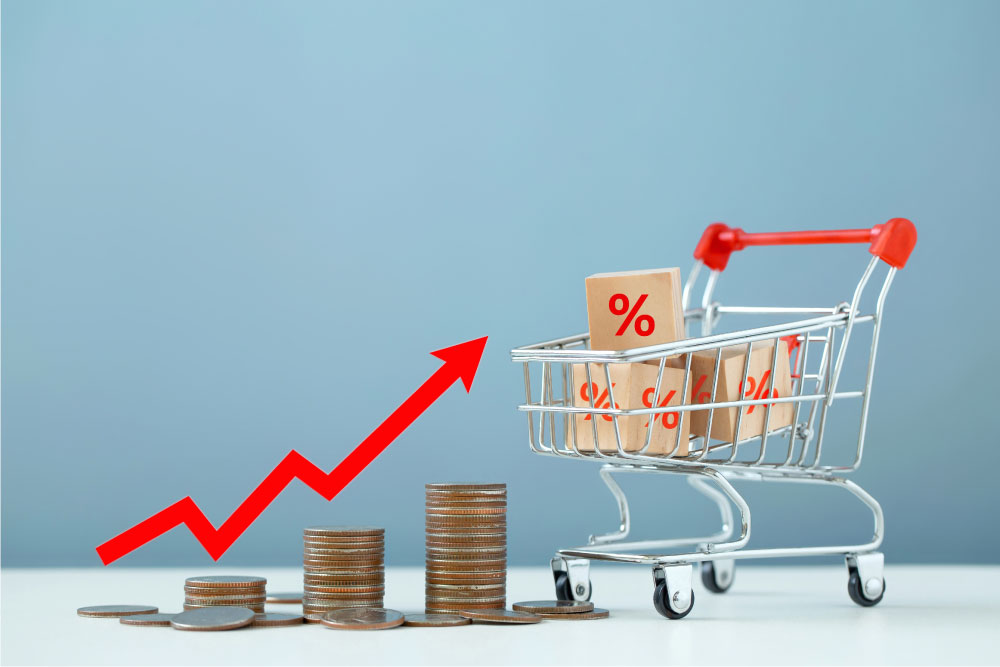MARKETS AND ECONOMY
ECONOMY: Inflationary Pressures Remain Front Burner amid CBN, FG’s Ambitious Strategy
Published
2 years agoon

By Cowry Assets Analysts
This week, our analytical focus shifts towards the determinants of inflation in Nigeria, as economic agents anticipate the release of the June 2024 Consumer Price Inflation (CPI) report by Nigeria’s Bureau of Statistics (NBS).
Read Also:
In May 2024, Nigeria’s headline inflation hit a fresh 28-year high, rising by 26bps to the 17th straight month of 33.95% y/y, representing a modest increase compared to the 49bps rise to 33.69% y/y recorded in the previous month.
May’s slower inflation reading marks the third consecutive month of moderation in headline inflation. The latest figures came amid a further rise in fuel prices following the government’s removal of subsidies on PMS, an increase in electricity tariffs, and currency weakness. So far in 2024, headline inflation has averaged 32.49%, compared to 22.20% in the first five months of 2023 and 24.52% for the entire year 2023.
Food Prices as major driver
Food inflation remains a significant driver of the headline inflation index, reaching 40.66% year-on-year in May 2024, the highest level in almost two decades. This surge is attributed to rising prices of essential food items, which continue to be significantly hindered by supply-side shocks arising from security challenges. On a month-on-month basis, food inflation decreased by 0.22%, from 2.50% in April 2024 to 2.28% in May 2024.
Over the past year, food prices in Nigeria have soared, driven by factors such as supply chain disruptions, currency depreciation, and the impact of climate change on agriculture. This has led to basic staples like rice, beans, and vegetables becoming increasingly unaffordable for the average Nigerian, stretching household budgets to their limits.
The food index constitutes over 51% of the inflation basket, and this escalation can be attributed to rising prices in fundamental food commodities, including bread, cereals, oil, and fat. Specifically, all 43 food items surveyed reported price increases on a year-on-year and month-on-month basis between April and May 2024.
An unweighted simple average, which does not account for consumption trends, shows that the average price of food items in the Bureau’s designated basket increased by 137.3% year-on-year and 13.4% month-on-month.
Inflation beyond the food component
Beyond the food component, the core inflation rate, which excludes farm produce and energy, surged by 20bps to 27.04% y/y in May. The higher core inflation reading was due to increased prices for items such as passenger transport by road, housing rentals, X-ray photography, pharmaceutical products, accommodation, and medical services.
The energy component
Meanwhile, the NBS price watch series highlighted that the prices of deregulated fuels such as Automotive Gas Oil (diesel) and Household Kerosene recorded significant increases, rising by 66.3% year on year and 20.3% year on year to N844.24/litre and N1,450.35/litre, respectively.
Similarly, Liquefied Petroleum Gas (LPG) prices revealed that the average cost of refilling a 12.5kg cylinder decreased by 7bps month on month but rose by 63.85% year on year to N15,627 in May. As noted by the NBS report, the Premium Motor Spirit (PMS) price watch showed that the average price paid by consumers for PMS accelerated by 223% year-on-year to N769.62/litre. The higher year-on-year price increase relative to other liquid fuels is primarily due to the rise in the pump price of petrol following the elimination of fuel subsidies.
Strategies to tame inflation
In response to the ongoing inflationary pressures, the Nigerian government has unveiled a comprehensive plan for 2024, focusing on the six-month suspension of import duties, Value Added Tax (VAT), and other tariffs on staple food items, raw materials, and direct inputs for manufacturing.
This includes agricultural production inputs such as fertilisers, seedlings, and chemicals, as well as pharmaceutical products, poultry feeds, flour, and grains. Additionally, rice millers will be authorised to import paddy rice at zero duty and VAT for an initial six-month period to boost local supply and capacity utilisation. This ambitious agricultural reform programme aims to enhance domestic food production.
Remarks
Cowry Research believes that these government measures, while ambitious, aim to provide much-needed relief from the current inflationary grip, potentially reviving hope among Nigerians and fostering a more prosperous and optimistic marketplace.
However, the effectiveness of these initiatives in delivering tangible benefits remains to be seen. As the next monetary policy committee meeting approaches, the CBN faces a dilemma: whether to continue tightening monetary policy or adopt a more cautious approach to monitor inflationary trends and key economic indicators.
We anticipate that a moderate increase in headline inflation will likely lead committee members to favour maintaining a tightening stance, potentially raising rates by 25 to 50 basis points. Our projections estimate a headline inflation rate of 34.25% for June 2024.
Share this:
- Click to share on X (Opens in new window) X
- Click to share on Facebook (Opens in new window) Facebook
- Click to share on WhatsApp (Opens in new window) WhatsApp
- Click to share on Pocket (Opens in new window) Pocket
- Click to share on Telegram (Opens in new window) Telegram
- Click to email a link to a friend (Opens in new window) Email
- Click to share on LinkedIn (Opens in new window) LinkedIn
You may like


Nigeria’s Inflation Moderates to 14.45% in November


Nigeria’s Inflation Eases to 20.12% in August as Food Prices Retreat


Nigeria’s Inflation Hit 34.80% in December – NBS


Inflation Drops to 32% in August to Sustain Respite — NBS


BREAKING: Inflation Rate Jumps to 34.19% in June


CBN Takes Credit for Rising but Slowing Monthly Inflation Rate








